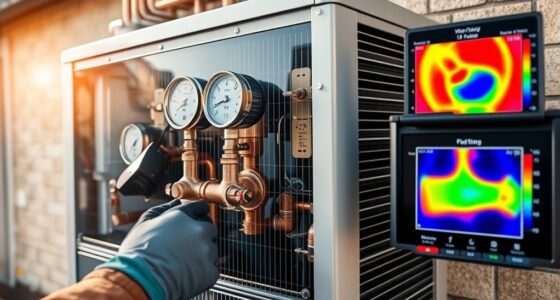We are all aware that “knowledge is power,” and when it comes to improving heat pump energy efficiency, we couldn’t agree more.
In this guide, we’ll walk you through the ins and outs of heat pump efficiency ratings, helping you choose the right size heat pump for your home, and providing tips for proper installation techniques.
We’ll also share advanced tricks and maintenance tips to optimize your heat pump’s performance.
Get ready to take control of your energy consumption and maximize efficiency.
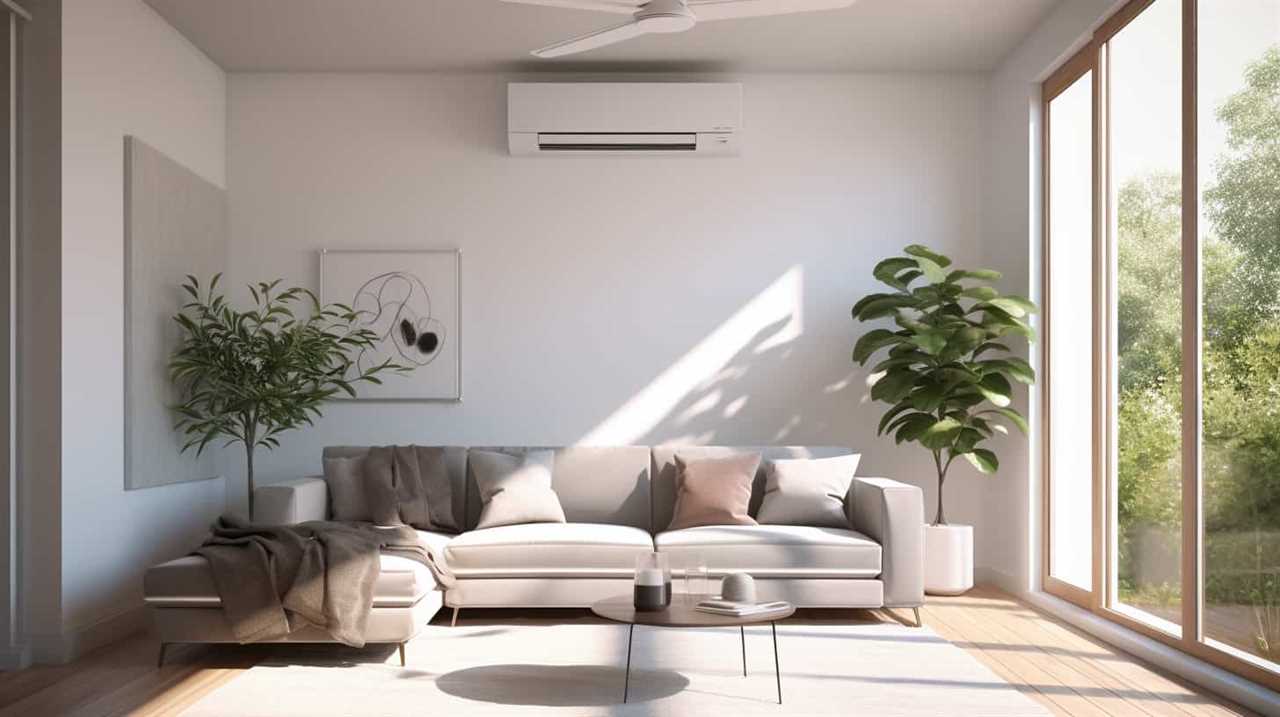
Key Takeaways
- Understanding heat pump efficiency ratings is crucial for assessing performance and choosing the right size heat pump.
- Proper sizing considerations, based on factors like home size, insulation levels, and climate, are important for efficiency and effectiveness.
- Proper installation techniques, including correct sizing and placement, enhance heat pump efficiency.
- Regular maintenance, including cleaning or replacing air filters and addressing maintenance issues, is essential for optimal performance and efficiency.
Understanding Heat Pump Efficiency Ratings
We’ll now delve into understanding heat pump efficiency ratings. Heat pump efficiency ratings are crucial for assessing the performance and effectiveness of these systems. By understanding these ratings, homeowners can make informed decisions to improve heat pump performance and maximize energy savings.
One of the key benefits of heat pump efficiency is its ability to provide both heating and cooling, making it a versatile option for homes. Additionally, higher efficiency ratings indicate that a heat pump consumes less energy to produce the desired heating or cooling effect, resulting in lower utility bills.
To improve heat pump performance, homeowners should look for units with higher seasonal energy efficiency ratio (SEER) and heating seasonal performance factor (HSPF) ratings. These ratings reflect the efficiency of the heat pump in different seasons, allowing homeowners to choose the most suitable option for their climate.
Understanding heat pump efficiency ratings is essential when choosing the right size heat pump for your home, as we’ll discuss in the next section.
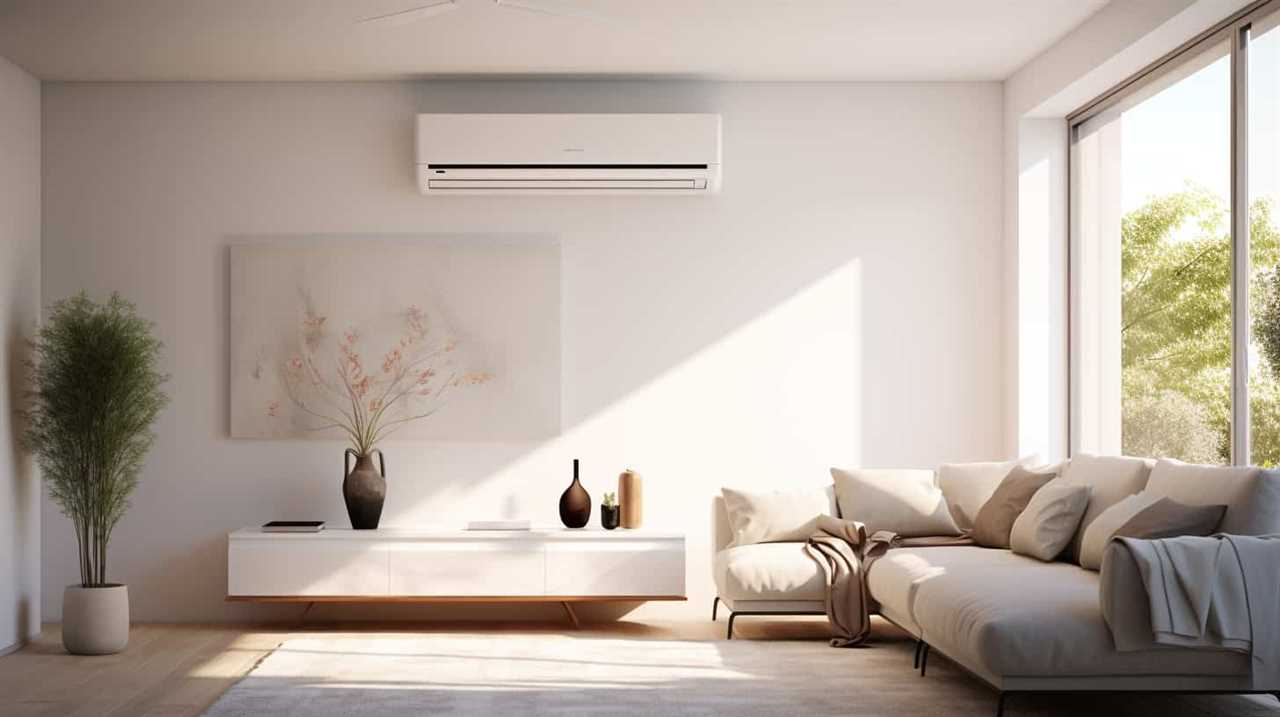
Choosing the Right Size Heat Pump for Your Home
Our main consideration when choosing the right size heat pump for your home is to ensure it meets your specific heating and cooling needs. Sizing considerations play a crucial role in determining the efficiency and effectiveness of your heat pump.
Factors such as the size of your home, insulation levels, and local climate all contribute to the sizing process. It’s important to conduct a thorough cost analysis to determine the appropriate size that offers the best balance between upfront investment and long-term energy savings.
Oversized heat pumps can lead to frequent cycling on and off, reducing efficiency and increasing energy costs. Conversely, undersized heat pumps may struggle to adequately heat or cool your home, resulting in discomfort.
By carefully considering sizing considerations and conducting a cost analysis, you can ensure optimal performance and energy efficiency for your home.

In the next section, we’ll discuss proper heat pump installation techniques to further enhance efficiency.
Proper Heat Pump Installation Techniques
For optimal energy efficiency, we recommend using proper heat pump installation techniques and following industry best practices.
Proper installation is crucial to ensure the heat pump operates efficiently and effectively. One important aspect of installation is ensuring correct sizing and placement of the unit. A heat pump that’s too large or too small for the space it’s intended to heat or cool will lead to inefficiencies and increased energy consumption.
Additionally, proper installation techniques include ensuring proper refrigerant charge, adequate airflow, and proper electrical connections. These factors contribute to the overall performance and efficiency of the heat pump.
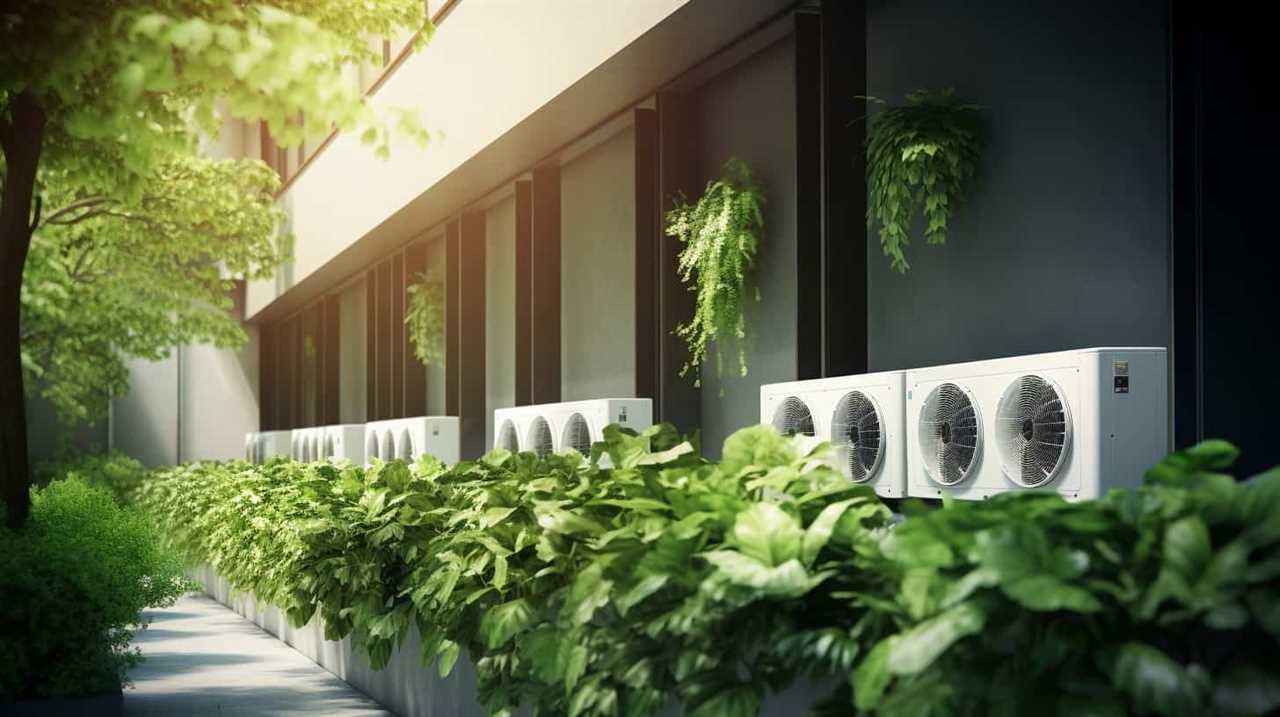
Optimizing Heat Pump Performance With Regular Maintenance
How can regular maintenance optimize the performance of our heat pump?
Regular maintenance plays a crucial role in ensuring the optimal performance and efficiency of our heat pump. By following a heat pump maintenance checklist, we can identify and address any issues that may affect its efficiency.
Common heat pump efficiency issues include dirty air filters, refrigerant leaks, and malfunctioning thermostats. Regularly cleaning or replacing air filters can improve airflow and prevent strain on the system. Detecting and repairing refrigerant leaks can ensure that the heat pump operates at its intended efficiency levels. Additionally, ensuring that the thermostat is calibrated correctly and functioning properly can help maintain a comfortable indoor temperature while minimizing energy consumption.
Advanced Tips and Tricks for Maximizing Heat Pump Energy Efficiency
To further maximize heat pump energy efficiency, we can implement advanced tips and tricks that optimize its performance. Here are four effective strategies:
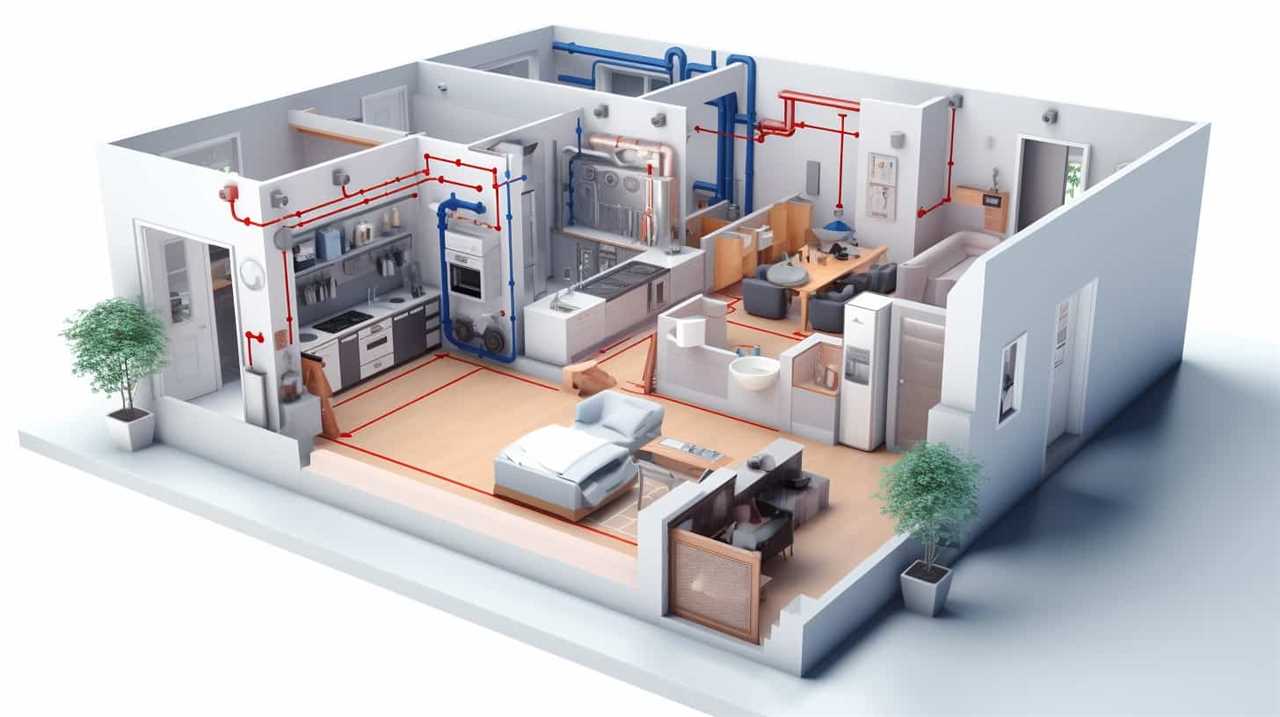
-
Smart thermostats: Installing a smart thermostat allows you to control and schedule your heat pump’s settings remotely. These devices can learn your preferences and adjust the temperature accordingly, ensuring efficient operation and reduced energy consumption.
-
Insulation upgrades: Upgrading your home’s insulation can greatly enhance heat pump efficiency. Proper insulation prevents heat loss or gain, allowing your heat pump to work more efficiently. Consider insulating walls, floors, and attics to minimize heat transfer and maintain a comfortable indoor environment.
-
Zoning systems: Implementing zones in your home enables you to heat or cool specific areas as needed. By directing conditioned air to occupied rooms and avoiding unnecessary heating or cooling, you can save energy and optimize heat pump performance.
-
Regular maintenance: Even with advanced features, regular maintenance is crucial for optimal energy efficiency. Clean or replace air filters regularly, check refrigerant levels, and ensure proper airflow. A well-maintained heat pump will operate at peak performance, consuming less energy and minimizing energy costs.

Frequently Asked Questions
How Long Does a Heat Pump Typically Last Before It Needs to Be Replaced?
Heat pump lifespan varies depending on usage, maintenance, and quality. On average, a heat pump can last 10-15 years before replacement. Signs to consider replacing include decreased efficiency, frequent repairs, and outdated technology.
Are There Any Rebates or Incentives Available for Upgrading to a More Energy-Efficient Heat Pump?
Yes, there are rebates and incentives available for upgrading to a more energy-efficient heat pump. These programs can provide financial assistance and promote energy savings, making the upgrade cost-effective in the long run.
Can a Heat Pump Be Used as the Sole Heating and Cooling System for a Home?
A heat pump can be used as the sole heating and cooling system for a home, but there are pros and cons to consider. It is important to do a cost comparison to determine if it is the most efficient option.
What Are the Potential Drawbacks or Limitations of Using a Heat Pump?
Potential drawbacks and limitations of using a heat pump include reduced efficiency in extreme temperatures, the need for supplemental heating in colder climates, and the initial cost of installation. However, overall energy efficiency is still high.

How Does the Efficiency of a Heat Pump Compare to Other Heating and Cooling Systems, Such as Furnaces or Air Conditioners?
Heat pumps are more efficient than traditional heating and cooling systems like furnaces and air conditioners. They use less energy to produce the same amount of heat or cool air, making them a more environmentally friendly option.
Conclusion
In conclusion, optimizing heat pump energy efficiency is crucial for reducing energy consumption and lowering utility bills.
One interesting statistic is that properly maintaining a heat pump can increase its efficiency by up to 25%.
By understanding efficiency ratings, choosing the right size heat pump, implementing proper installation techniques, and regularly maintaining the system, homeowners can maximize their heat pump’s performance and save on energy costs.

Implementing advanced tips and tricks can further enhance the energy efficiency of the heat pump.



